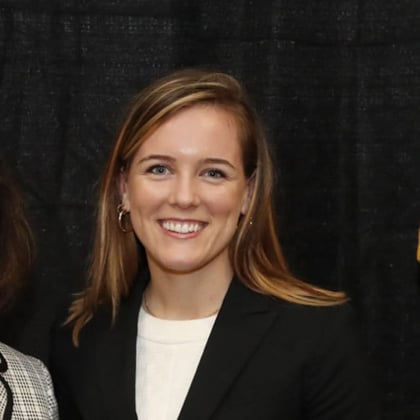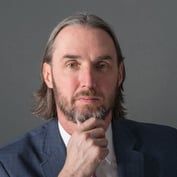Kyla Scanlon, 24, is determined to reshape financial education. The innovative, entertaining content creator, who began trading options at age 16, has a platform in the works she describes as “a financial playground.”
It will be a destination where people can interact and “play with content and different ideas,” she allows in an interview with ThinkAdvisor.
“I’m still building it — so I don’t want to give too much away!” she says.
If the platform is anything like her amusing, instructive video skits on social media, countless folks will be eager to come out and play.
The social media influencer has more than 67,400 followers on Twitter and 98,100 TikTok fans.
Out of college a little over two years, Scanlon is making waves with her fresh approach and frank opinions on the economy and markets in newsletters, blogs and videos.
In the typically monologue-style latter, she speaks at a rapid clip and rocks a charming, self-assured smile.
Holding forth recently on two different videos, she declared: “Elon Musk and what he stands for is a perfect example of the meme economy” and “Costco is the epitome of the consumer.”
She finds monetary policy “really fascinating” and crypto “a bullish bet on humanity.”
In the interview, the investor, who at 20 had her own blog, “Scanlon on Stocks,” argues that “the market is driven by memes and that focusing on fundamentals “just doesn’t make sense anymore.”
From Kentucky, she was schooled in gifted classes and at Western Kentucky University majored in finance, economics and data analytics. She graduated with a bachelor’s degree in 2019.
Hired right away by Capital Group/American Funds, she relocated to the firm’s Los Angeles headquarters but left a year and nine months later to start building her own digital financial education platform.
ThinkAdvisor recently interviewed the bicoastal Scanlon, who was on the phone from L.A. The inventive Gen Zer, whose podcast is called “Let’s Appreciate” (as in capital appreciation), sums up her “life thesis” as: “How do we create financial accessibility and equality for everybody?”
Here are highlights from our conversation:
THINKADVISOR: You’re both a financial person and an entertaining person — a pretty rare combination.
KYLA SCANLON: I know. Most finance people are relatively boring, it seems.
You’re so good at creating and starring in your videos. Did you ever study acting?
No. I don’t think what I do is acting. If anything, it’s more like standup comedy or improv comedy. That’s how I, kind of, talk in real life. So it’s just me being me.
Do you have aspirations to be a standup comic?
No. I’m very introverted. I wouldn’t enjoy going on stage in front of an audience.
You don’t seem introverted!
I am. I am.
With regard to finance and investing, how have you developed the insight you provide?
I read a lot of different people, a lot of newsletters, I pay very close attention to smart people and listen to what they’re saying. That’s how I learn.
You’re into behavioral analysis, so you write. Do you read any behavioral finance experts such as Robert Shiller, Richard Thaler, Daniel Kahneman?
Yes, Kahneman is good. I sit at the intersection of philosophy and the markets. So I read philosophers and then apply those lessons to the market.
This past March you wrote that the stock market is driven by memes — such as SPACs and NFTs — rather than fundamentals. Do you still feel that way?
Yes, even more so than when I wrote that piece. You can see it now with Shiba Inu coin and Dogecoin and even some stocks, like what’s happening with Tesla.
It just doesn’t make sense anymore [to focus on fundamentals], and a lot of people would probably agree with me.
You were trading options at age 16 when you were in high school in Kentucky. How did you get interested in investing?
My father, who worked at General Electric, traded options for himself on the side. He said to me, “This would be an interesting way for you to learn about money.”
It was: How do you build a better future for yourself? Well, money is a big part of that. So I figured if I understood money, that would be a really good path.
After graduation from Western Kentucky University in 2019, you took a job as an associate at Capital Group/American Funds in Los Angeles. But you stayed there only a year and nine months. Care to say why?
It’s a great company, but I wanted to build something, and I couldn’t do it there. So I left.
What do you want to build?









 November 01, 2021 at 03:13 PM
November 01, 2021 at 03:13 PM











